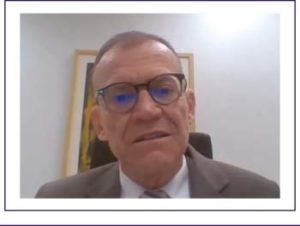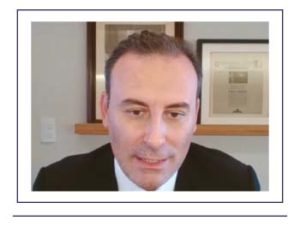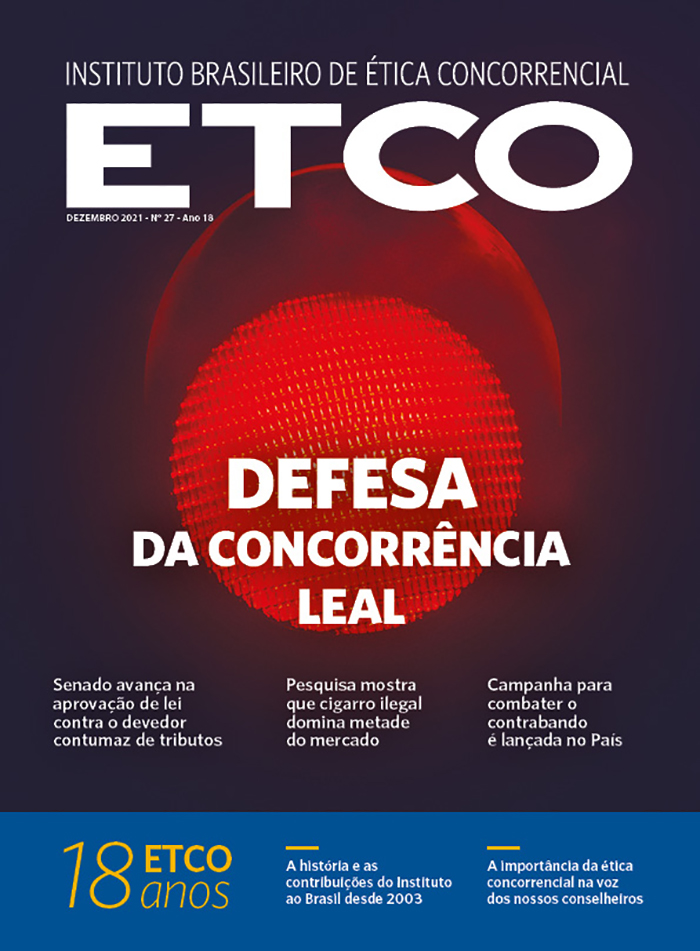Bill against persistent debtor advances in Senate
PLS 284 is approved by the Committee on Transparency, Governance, Inspection and Control and Consumer Protection and is ready to go to the plenary vote

Finally, he started walking again. But we cannot settle down until it becomes law. I see no justification for not approving a project that combats a practice as harmful to the business environment and the country as the habitual debtor of taxes.”
It is in this tone, which mixes celebration and indignation, that the executive president of ETCO, Edson Vismona, comments on the progress made in the processing of PLS 284/17 in the Senate. At the end of September, the report by senator Fabiano Contarato (Rede-ES) was approved by the Commission on Transparency, Governance, Inspection and Control and Consumer Defense (CTFC), the last phase before its consideration by the Senate plenary. It now depends, therefore, on the decision of the President of the House, Rodrigo Pacheco (DEM-MG), to place the project on the voting agenda.
In September, Vismona and Contarato participated in a debate on the Impacts of the Permanent Debtor on the Country's Economy promoted by the Poder360 website, together with former senator Ana Amélia Lemos, author of PLS 284, General Guilherme Theophilo, CEO of Instituto Combustível Legal, member of ETCO, and the attorney of the Attorney General of the National Treasury Claudio Seefelder (see article on page 9).
The fight against the persistent debtor of taxes is one of ETCO's main banners. It concerns an illicit competitive practice that mainly affects productive sectors with high taxation, such as fuel, cigarettes and beverages. It consists of structuring companies with the purpose of not paying taxes – they even declare the tax, but never pay, this is the characteristic of persistent default.
The difference may seem subtle, but it isn't. In Brazil, those who sell products clandestinely, without informing the tax authorities, are liable for the crime of tax evasion in the criminal sphere and can even be arrested. However, declaring and owing taxes is not a crime, and the punishments for debtors are limited to the financial field. The problem is that tax proceedings in Brazil take a long time, with an average duration close to twenty years. And persistent debtors take advantage of this weakness in the system to make money at the expense of unfair competition and the exchequer.
Modus Operandi
They act like this: they set up companies, usually in the name of “oranges”, they sell their products at prices that are unfeasible for those who collect taxes correctly, they declare this movement to the tax authorities, but they simply do not pay the taxes. While the collection processes run through all administrative and judicial spheres, the real owners are diverting profits to other businesses in a way that is difficult to trace.
When the company is ultimately condemned by the courts, there is no equity to settle the debt. The owners abandon that business and set up another one to do it all over again, in the name of new “oranges”. In this continuous movement, they destroy honest competitors, drive away investments from reputable companies and keep the tax money on which the State depends to fulfill its role in areas such as health, social assistance, education and public safety.
Combating this practice, which is so harmful to the business environment has been especially difficult as there is no national law in the country distinguishing the habitual debtor from legitimate debtors, who fail to pay their taxes in certain periods, but are able and interested in resolving the situation in the future. . State laws, created to combat the constant default of ICMS, usually have their constitutionality challenged by large debtors, in processes that drag on in court for several years.
Changes supported by ETCO
The solution to the problem began to be designed in 2003, with the approval of Constitutional Amendment No. 42, which included article 146-A in the Federal Constitution, with the contribution and support of ETCO. The provision authorized the creation of a complementary law establishing “special taxation criteria with the objective of preventing competition imbalances”. Since then, ETCO and its associates have been trying to sensitize the Congress, responsible for this type of initiative, about the importance of approving this complementary national law.
In 2017, the tide seemed to have turned against persistent debtors when the then senator Ana Amélia Lemos (PP-RS) presented PLS 284/17 to the Senate, proposing the regulation of the constitutional article. The project was debated and improved by the House's Committee on Economic Affairs (CAE), which the following year analyzed and approved a replacement for the rapporteur, senator Ricardo Ferraço (PSDB-ES).
But, in 2019, a new legislature took office – and neither Senator Ana Amélia nor Senator Ricardo Ferraço are part of it. And the project was stopped for more than a year, until its rapporteurship in the Commission for Transparency, Governance, Inspection and Control and Consumer Defense (CTFC) was taken over in May of this year by senator Fabiano Contarato, who streamlined its proceedings.
The text approved by the CTFC in September has the same content as the proposal that passed by the Committee on Economic Affairs in 2018. It authorizes the Union, States and municipalities to adopt special regimes against companies in the fuel, cigarette and beverage sectors that practice "substantial default, reiterated and unjustified tax" in such a way that it may cause a competitive imbalance.
What does PLS 284/17 say
The PLS establishes seven special criteria that can be applied against persistent debtors: maintenance of uninterrupted inspection in the establishment; special control of tax collection, economic, equity and financial information; compulsory installation of production, sales and stock control equipment; anticipation or postponement of the triggering event; concentration of tax incidence in a certain phase of the economic cycle; adoption of a specific rate, per unit of measure, or ad valorem, levied on the value of the transaction or on the price that the product or its similar would reach in a sale under free competition conditions; and adoption of an estimation regime.
The project preserves all taxpayers' defense rights. However, it more quickly restrains the actions of the persistent debtor by allowing the suspension of the operation registration of the company that does not cooperate with the criteria of the differentiated regime. And the cancellation of registration if it also adopts one of the following conducts: it has been created for the practice of structured tax fraud, including for the benefit of other companies; be in the name of “oranges”; participate in an organization created with the purpose of not collecting taxes or circumventing the mechanisms for collecting tax debts; produces, trades or stocks stolen, stolen, counterfeit or adulterated merchandise; use smuggled or embezzled goods as input.
PLS 284 has already completed the stages of public debate and was approved by two Senate committees. “It now remains for the president of the House, Rodrigo Pacheco, to include him in the voting agenda”, says the president of ETCO. "And to senators, say which country we want: one in which honest businessmen, who pay the taxes that promote the nation's development, can compete for the market on equal terms or for a Brazil that favors the wrong."
Impacts on the country's economy
The website Poder360 held, on September 15th, the webinar Impacts of the Debtor in the Country's Economy. The debate took place two weeks before the approval of the report by senator Fabiano Contarato (Rede-ES) by the Commission on Transparency, Governance, Inspection and Consumer Control and Defense (CTFC). The event was attended by senator Contarato, executive president of ETCO, Edson Vismona, former senator Ana Amélia Lemos, author of PLS 284, general Guilherme Theophilo, CEO of Instituto Combustível Legal, and attorney at the Attorney General's Office of the National Treasury Claudio Seefelder.
The following are excerpts from what the debaters said:
Collaboration with tax evaders

Senator Fabiano Contarato (Rede-ES), rapporteur of PLS 284 at CTFC
“It is past time for the State to give an answer to that entrepreneur who effectively complies honestly and collects all taxes, to provide a quality service and comply with what is mandated by the democratic rule of law. Because all laws must be complied with by all in order to ensure free competition in a fair and equal way. This bill comes at a very opportune moment because, when the Parliament does not give this answer to curb the conduct of this persistent debtor, it is colluding with this practice.
The State's omission is relevant when it does not implement measures that will mitigate or reduce this criminal way of acting by persistent debtors in large sectors, such as tobacco, beverages and fuel.
The persistent debtor exists because the State is inefficient in inspection. If the State is inefficient and we have collection actions that are perpetuated in the jurisdictional system, it has the possibility and certainty of impunity. It's not even the sensation, it's the certainty of impunity.
So he uses this criminal mechanism to gain an immediate, easy gain, which will affect the equality of free competition. With this, it will ensure that the honest entrepreneur, who complies with all the rules, with the collection of their taxes, does not sustain themselves in the market.”
Damage to competition and to the Country

Ana Amélia Lemos, former senator, author of PLS 284/17
“The persistent debtor is a result of the complexity of our tax and fiscal system, which precisely allows for the practice of the crime of tax evasion. It provokes an absolutely unfair competition with those entrepreneurs and honest businessmen, in areas that are very sensitive to taxes, such as fuel, cigarettes and alcoholic beverages.
The bill tries to fight the persistent debtor, nothing to do with that occasional debtor who, at some point in their economic activity, has had some difficulties. And even the default debtor, the law gives all the guarantees and rights of ample defense. So, there is nothing to discuss further about the scope of the debate held in the Federal Senate, in various commissions. The scope of this measure is also to improve the business environment in our country.
A serious country cannot live with this degree of evasion of money that is needed in the areas of health, education, social inclusion.
My contribution was to have received a very well-developed argument by all actors in this market, including ETCO, which worked so hard, and the Legal Combustible Institute.”
Strange resistances in Parliament

Edson Vismona, executive president of ETCO
“The cause of the persistent debtor is absolutely convergent between the interests of taxpayers and the treasury. It is strange to see how such a convergent project is resisted. A bill that fights those who are structured to intentionally not pay taxes, harming the tax authorities in billions, harming fair competition, because they manage to have an absolutely illicit advantage, harming the consumer, because behind an action by the persistent debtor we we are not going to identify the best market practices.
It is very common to identify the persistent debtor defrauding fuel, selling illegal cigarettes. But it is a picture of what we see in this country: what is right, what represents legitimate national interests, is not always accepted.
We have to harmonize this understanding, consolidate this flag and defend what is fair. Differentiating what is the taxpayer who may be experiencing a difficulty and not pay tax, is life, who is structured to not pay tax. It creates a system of oranges. His maxim is 'I owe, I don't deny, I don't pay'”.
Link with criminal factions

Guilherme Theophilo, CEO of Instituto Combustível Legal
“Normally, persistent debtors are linked to criminal factions, they are linked to evil, so they also participate in the diversion of pipelines, in fraud at gas pumps, a series of events that come with the persistent debtor. Because that person's nature is already a bad one. He is already turned to dishonesty, to lack of ethics, to lack of transparency. In 2018 alone, according to FGV data, we had BRL 14 billion in tax evasion in the fuel sector.
The approval of PLS 284 is urgent. Because we need to be supported by a law, because today we do it, discover the fraud, but then the next day it is already working under another name, with someone else. We are thinking, together with ETCO, the IBP (Brazilian Institute of Oil and Gas), and Sindicom (Union of Fuel and Lubricant Distributors), to integrate these efforts to support a Mixed Parliamentary Fuel Front. This is essential for us to publicize this very important agenda within the National Congress, from one of the sectors that have the highest revenue for governments.”
Separating the chaff from the wheat

Claudio Seefelder, PGFN Attorney
“This PLS makes concrete the principles of tax equality, free competition, free enterprise, tax neutrality and the fundamental duty to pay taxes. The importance of these normative instruments is to enable a differentiated and rigid treatment to the persistent debtor.
This rule is essential for us to separate the wheat from the chaff: distinguish the debtor who really goes through a momentary situation and who seeks the instruments of installment payment, tax transaction, to re-establish and pay to keep up with their taxes, from the one who has a repeated practice of tax evasion.
The STF has signaled that the default debtor should be treated differently. The Supreme Court's judgments have the ink turned to this persistent debtor, through an intermediary, with fraud, simulation and deceit. I'm sure everyone who is serious in this country is looking to restore legality.
This new rule, which will give effect to the act practiced by the persistent debtor, will be a very valuable instrument in the daily struggle that we have had for a long time in the search to recover assets, resources, from those debtors that unbalance the competitive market.”





